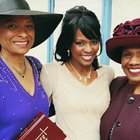
Abid Katib/Getty Images News/Getty Images
Muslim women attend mosques throughout much of the Islamic world, from the Masjid al-Haram at the Kaaba in Mecca to mosques from diverse backgrounds worldwide. However, not all Muslims agree that women should be present in communal worship, and even mosques that accept the practice often treat women differently from men.
Women Attending Mosques
As UCLA Islamic law professor Khaled Abou El Fadl observes, accounts of women attending worship services at mosques go all the way back to the time of the Muhammad himself. Not only does the Quran emphasize equality and condemn keeping people away from communal worship, but the hadith, the collections of sayings and incidents from the life of the Prophet, make reference to women praying and speaking in mosques with men. For example, since some men were wearing robes that left them exposed when lying prostrate in prayer, a hadith commands women to wait for the men to get up first before lifting their own heads off the ground.
Seating Arrangements
The authors of Design Criteria for Mosques and Islamic Centers, a global survey of Muslim worship architecture, note that women constitute upwards of 50 percent of the typical urban mosque community, with mosques exhibiting significant variety in their structural accommodations for women attendees. Progressive mosques tend to treat women and men as equals, allowing them to intermingle freely. Many other mosques, however, separate women from men. Techniques for segregating women from men include creating a separate room or balcony area, putting up a curtain or partition, and seating women behind the women. As Muslim filmmaker Zarqa Nawaz shows in her documentary "Me and the Mosque," some women even have to watch prayer services through a one-way mirror embedded in a wall.
Restrictions on Attendance
Not all Muslims agree that women should be allowed to attend communal worship in mosques, and even religious authorities who permit the practice can place strict limits on attendance. For example, as Abou El Fadl notes, a number of fundamentalist leaders have banned or discouraged women from going to mosques, arguing that their presence creates sexual temptation for men and citing disputed hadith that say a woman's place for prayer is in the home. Among conservative Islamic leaders who do not go that far, it is nonetheless common to encounter such rules as a requirement that women arrive through a separate entrance or a ban on women attending mosques when they are menstruating.
Women and Leadership
Not only have progressive Muslims challenged the legitimacy of such practices like segregating women from men and banning women from worship during menstruation, but they are also more open to having women lead services in mosques. One prominent advocate on this front is Muslim journalist Asra Nomani, whose "Islamic Bill of Rights for Women in the Mosque" calls for comprehensive gender equality and acceptance. Other significant initiatives aimed at improving the treatment of women in mosques include lists of women-friendly mosques in various countries, the women-only mosques in China and the burgeoning women's mosque movement in Egypt.
Related Articles

Rules for Pentecostal Women

What Were the Traditional Gender Roles ...

Why Some Men Aren't Successful With ...

What Is the Proper Way to Get Married ...

The Pros & Cons of Gender Roles

Coptic Orthodox Dress Etiquette

Carol Gilligan's Theory of Gender & ...

Chemicals That Stop Testosterone ...

Wedding Etiquette for Stepparents

How Absent Fathers Affect Men

Does a Married Woman Need Her Husband's ...

How Does Stereotyping Affect ...

The Difference Between Verbal & ...

What Types of Clothes Do They Wear in ...

Marriage in Mexican Culture

What to Wear to A Muslim Wedding

Why Men Like to Wear High Heels

What to Wear to a Funeral for Women

How Did the Practice of Men Taking ...

How to Name a Baby According to Islam
References
- Kingdom of Saudi Arabia: Fatwas of Ibn Baz: vol. 29; Kitab Mulhaqat Al-Salah (Book of Additional Features of Salah); "The Description of Salat (Prayer): The Ruling on Passing in Front of a Person Who Is Offering Prayer in Al-Masjid Al-Haram (The Sacred Mosque)"
- Me and the Mosque; Zarqa Nawaz, dir.
- Speaking in God's Name: Islamic Law, Authority and Women
- Hadith: Sahih Muslim; vol. 4, chap. 26: The Praying Women Have Been Commanded Not to Precede Men in Lifting Their Heads from Prostration
- Design Criteria for Mosques and Islamic Centres; Akel Kahera et al.
- The Idea of Women in Fundamentalist Islam; Lamia Rustum Shehadeh
- Fatwa Islam: The Woman Prays in the Masjid Unless She is Sexually Defiled or Menstruating
- Standing Alone: An American Woman's Struggle for the Soul of Islam; Asra Nomani
Writer Bio
John Green is an attorney who has been writing on legal, business and media matters for more than 20 years. He has also taught law school and business courses in entrepreneurship, business enterprise, tax and ethics. Green received his J.D. from Yale Law School and his Ph.D. in religion from Duke.
Photo Credits
Abid Katib/Getty Images News/Getty Images